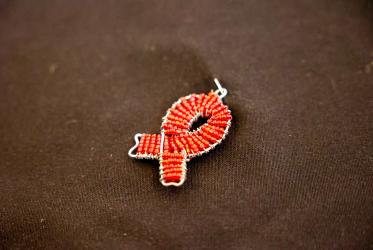Bishop Moses Deng-Bol of Wau Diocese of the Episcopal Church in South Sudan, believes in a church that encourages forgiveness, reconciliation and peaceful co-existence. In a recent interview he shared how churches in his country are trying to address issues presented by the HIV pandemic.
Deng-Bol has been engaged with the Ecumenical HIV and AIDS Initiative in Africa (EHAIA), a project of the World Council of Churches (WCC), which he says has inspired religious leaders as well as congregation members to challenge the stigma attached to HIV and the exclusion of HIV-positive people from their communities.
How is South Sudan responding to the challenges of HIV and AIDS?
The country is responding in various ways, including awareness raising campaigns aimed at preventing new infections and providing treatment and care for those who are already infected. These campaigns are waged by various institutions, including the government, churches and non-governmental organizations.
The response is, however, still limited; and in major towns as well as rural areas a majority of people are vulnerable to the disease. Voluntary counselling and testing (VCT), also known as client-initiated HIV testing and counselling, is rarely available and known in the country.
HIV is considered a generalized epidemic in South Sudan, with a rapid increase in its spread and with more than 128,000 people living with HIV. People who are more at the risk of HIV infection include refugees and internally displaced people, with women in the majority.
How is violence, the return of refugees and resettlement affecting HIV mitigation programmes?
There is a real fear that the return of refugees and internally displaced persons from neighbouring countries and regions will increase the spread of HIV. This is a difficult situation, since the local communities are not well prepared to respond to HIV and most of them lack knowledge and skills to mount an appropriate response.
Resettlement and conflicts often involve the rape of women, which could lead to new infections. Young people are also among the most affected and vulnerable to the threat of HIV in South Sudan. This is a huge challenge, which is connected to the wider and complex issues of conflict and displacement.
How are churches responding to HIV in South Sudan?
The church intervention in South Sudan mainly involves awareness-raising campaigns using the local church networks and training local pastors, so that they can pass on the message to their congregations. To deal with the stigma attached to HIV, the churches are training members and encouraging those church leaders who are HIV-positive to come out openly and declare their status.
This message has been taken seriously, such that Archdeacon Andrea Ngong Deng declared publicly that he was HIV positive last year. He became the first religious leader in general and in particular the first Christian pastor to do so in the whole of South Sudan. His declaration has made a significant contribution to the reduction of stigma.
However, this has been a difficult decision for Archdeacon Ngong, as being HIV-positive is something that is misunderstood as a “sexual sin” in society. Yet he overcame his apprehensions and was able to access support from our church and EHAIA colleagues. A publication that provided him with courage to accept and declare his HIV positive status is Called to Care Toolkit - Positive Voices: Religious Leaders Living with or Personally Affected by HIV and AIDS.
How do you think EHAIA has inspired the churches’ response in South Sudan?
EHAIA has been focusing its activities on training religious leaders, including church leaders as well as Muslim leaders, on prevention and stigma reduction through its awareness raising campaign. Archdeacon Ngong was one of the beneficiaries of EHAIA’s training, which is what encouraged him to take the HIV test, and therefore I share his story as an inspiring one.
The church in South Sudan has the ability to make a huge contribution in the fight against HIV because it has the numbers and willingness to do the work. The only challenge is the lack of resources to do the work. I would appeal to churches around the world to help the church in South Sudan with the resources that they need to fight the disease.
[696 words]
Read also:
EHAIA, an African initiative going beyond Africa (WCC feature article of 1 March 2012)







